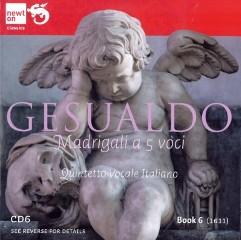Gesualdo da Venosa - Madrigali a 5 Voci Libro VI (2012)
Gesualdo da Venosa - Madrigali a 5 Voci Libro VI (2012)

[1] Se la mia morte brami [2] Belta, poi che t'assenti [3] Tu piagni, o Filli mia [4] Resta di darmi noia [5] Chiaro risplender suole [6] 'Io parto' e non piu dissi [7] Mille volte il di moro [8] O dolce mio tesoro [9] Deh, come invan sospiro [10] lo pur respiro in cosi gran dolore [11] Alme d'amor rubelle [12] Candido e verde fiore [13] Ardite zanzaretta [14] Ardo per te, mio bene, ma l'ardore [15] Ancide sol la morte [16] Quel 'no' crudel [17] Moro, lasso, al mio duolo [18] Volan quasi farfalle [19] Al mio gioir il ciel si fa sereno [20] Tu segui, o bella Clori [21] Ancor che per amarti [22] Gia piansi nel dolore [23] Quando ridente e bella Quintetto Vocale Italiano: Karla Schlean soprano Clara Foti mezzo-soprano Elena Mazzoni contralto Rodolfo Farolfi tenor Gastone Sarti baritone Dmitri Nabokov bass Angelo Ephrikian – director
Gesualdo's Madrigali a cinque voci, libro sesto, published in the S. Molinaro collection of 1613, reveals the composer's fully mature style, and was written in imitation and rivalry, a common practice among madrigal composers, of Nenna's works. Especially notable are Gesualdo's chromaticism, modal counterpoint, and rhythmic invention in these 23 madrigals.
Like early ethnomusicologists who superimposed Western notation and ideas on ethnic music before asking the "natives" how they conceived of their own music (thus making many erroneous assumptions), puzzled commentators on Gesualdo's music have often utilized standard harmonic analysis instead of approaching the music from the ideas of counterpoint and modality that were prevalent in his time. Basically, the unusual chromatic progressions in Gesualdo's work are the result of raising and lowering individual voices by half steps as a kind of expressive timbre modulation, a brightening (adding sharps) or darkening (adding flats), tied to the meaning of the words. For example, the (in-)famous madrigal No. 17 "Moro, lasso, al mio duolo" (I die, languishing, of grief) opens with the slowly descending, sighing chords C sharp major, A minor, B major, G major, and cadences normally E dominant seventh to A minor. The first two chords and the next set of two chords both suggest some Wagnerian progression centuries ahead of its time, but in fact the writing is purely modal with these chromatic modifications to add expression. Many of the madrigals open with unusual progressions by minor and major third roots in block harmonies and then proceed toward straight, unmodified modal counterpoint in faster subdivisions of the main tempo; for example, No. 15 "Death alone can kill"...A major to C sharp major to A major ), No. 21 "Even though, through love of you, I am consumed"...E major to G minor), No. 2 "Beauty, since you depart"...G minor to E major), No. 6 " 'I go', and no more, I said, for the pain"...starts in a harmonic minor and later offers E diminished to B major to C minor, etc.), etc.
By contrast, many other madrigals are in a straightforward modal style, and are sometimes played instrumentally for variety when a performance is given of the entire Book. For example, Nos. 8, 11, 12, 15, 16, and 18. Expressive cascading imitations can be found in Nos. 14 (on the words "ardo per te" -- I burn for you), 13 on "Fuggi poi," 21 on "rimirar suole," 3, 23, 19, and several others. Rare skips by a large interval into a dissonance can be found in Nos. 4 and 13 with its spectacularly modulated extended ending. Gesualdo is also especially fond of Spanish-type Lydian mode cadences, especially throughout No. 7, and provides a lovely Mixolydian mode beginning for No. 22. Gesualdo is also fond of subdividing lines and syllables and of the emphatic pause effect, especially in No. 10 "Io pur respiro in così gran dolore" (Even in agony, I still breathe) where "respiro" is divided up to suggest someone gasping for air. ---'Blue' Gene Tyranny, Rovi
download (mp3 @320 kbs):
uploaded yandex 4shared mega mediafire solidfiles zalivalka cloudmailru oboom








